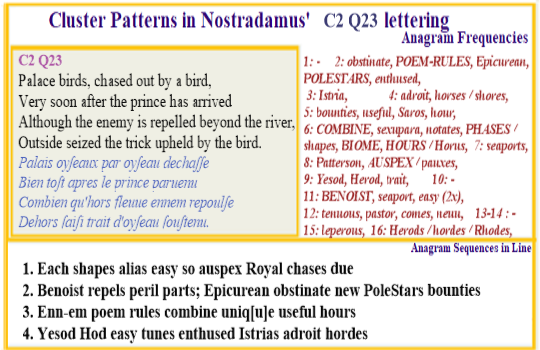 Analyses of all verses
Analyses of all verses
|
 Web Site
Web Site |
 All
Sefirots All
Sefirots |
Nostradamus C2 Q23: Method behind the madness of studying birds.
Copyright: Allan Webber, December 2015
 Nostradamus took a keen interest in the way the world had
been perceived up until his own day but that interest was for observation
and comparison purposes to more easily define that which is yet to
come.
Nostradamus took a keen interest in the way the world had
been perceived up until his own day but that interest was for observation
and comparison purposes to more easily define that which is yet to
come.
The text of this verse has several references to birds and they make sense when considered as metaphors for soothsayers whose place in royal palaces diminished with time. But in the future these will come to be highly regarded once more.
Of the anagrams supporting this idea the one for auspex ( ſeaux p) has highest significance for it is another term for an augur, a person who foretells the future through the study of birds. The reason behind this verse is Nostradamus wish to show that many ancient practices had practical elements based on observations of worldly concepts that should not be ignored. This theme is carried into verse C2 Q26.
# Istria: the largest peninsula in the Adriatic Sea with Croatia, Slovenia and Italy each having ownership of different parts.
# Saros: a cyclical period first noted by the Chaldeans consisting of approximately 223 synodic months that can be used to predict eclipses of the Sun and moon.
# Yesod: the ninth sephirah in the kabbalistic Tree of Life - it translates spiritual concepts into actions that unite us with God and is often associated with both the Moon and the Holy Spirit.
# Hod: the eighth sphere in the kabbalistic Tree of Life - described as being a force that breaks down energy into different, distinguishable forms, and it is associated with intellectuality, learning and ritual.
# Auspex: Latin: one who observes birds; a soothsayer or augur.